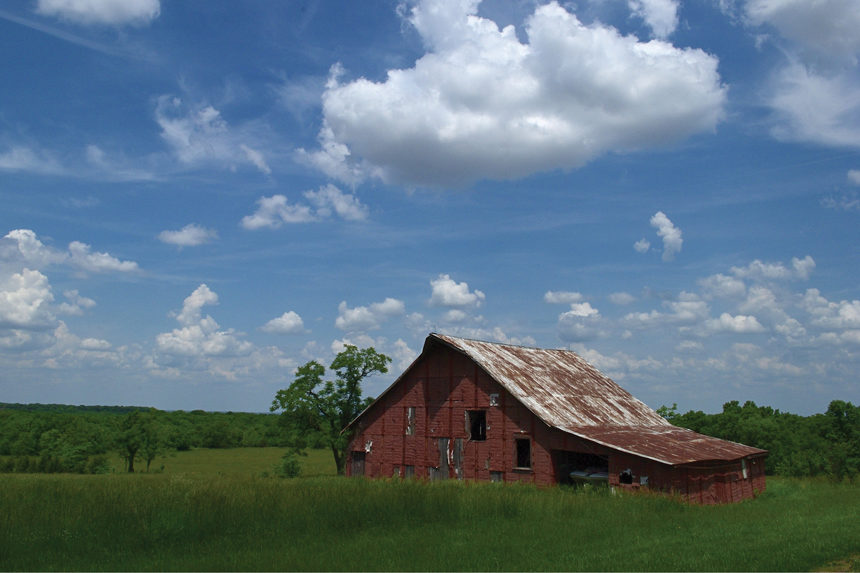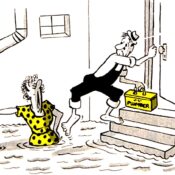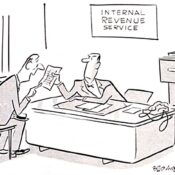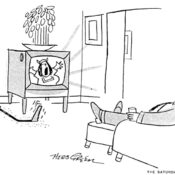In anticipation of eventually moving to our farmhouse after retirement, I’ve begun setting up a workshop in the barn on our property, hoping the barn won’t collapse before we relocate. It was built in 1921 by my wife’s grandfather and father, who were excellent farmers but poor carpenters, disciples of the theory that with enough nails anything could stand. The barn tilts precariously to the west but is fortuitously held upright by the winds blowing down the valley, keeping it vertical.
Two of the corner posts have rotted away at ground level, so the barn stands by habit, not by physics, but I’m hopeful the pegboard I installed to hold my tools will be just the bracing it needs to prevent collapse. If it does fall, I will receive $10,000 from my insurance company, which I will use to buy a gallon of gasoline to burn it where it sits, then hire the local carpenter, Ross Hutcheson, to build my wife and me $9,995 worth of barn.
My wife’s kin spent $300 to build the barn in 1921, which would be $4,900 in today’s money, though I’m not so naive to think the barn could be replaced for anywhere near that. I’m estimating that $9,995 will build me a largish shed made of rough-sawn poplar boards, provided I don’t electrify or winterize it. But this will hold my mowing tractor, garden tools, a workbench, and the motorcycle I keep at the farm to travel the backroads into town.
The motorcycle is a 1984 Honda CT110, made the same year my wife and I were married. All summer long, it sputtered up hills and I worried it was nearing the end of its life. But on an autumn day, while wheezing up a hill, it occurred to me the choke had been on all summer, and when I reached down and flicked it off, the engine settled into a steady purr and raced smoothly up the hill. I’ve been riding motorcycles since 1977, traveling hundreds of thousands of miles, and should have realized when a choke was on instead of off, but that’s the joy of motorcycling: It’s full of surprises. I haven’t told any of my motorcycle friends about riding all summer with the choke on, and I’d be grateful if you kept it between us.
The motorcycle merits a weather-tight shed to keep it protected from the elements, though I’ll be sad when my barn falls. It’s the last remaining outbuilding on our farm built by my wife’s grandfather, Linus Apple, whom I never met but have been told by people who should know that he was a piece of work, the kind of person I find endlessly fascinating. Niceness is a virtue, but not much fun to write about. I could write a book about Linus Apple, and someday might. He neither read nor wrote and signed his Social Security checks with an X, but he could add columns of numbers in his head faster than the teller at the bank could on her machine.
Regarding my workshop, I’m building it because something always needs repaired on a farm, whether it’s a gate, a tractor, or a pump. No actual farming ever gets done on our farm for fixing the paraphernalia associated with farming. Farmers don’t tend crops or livestock so much as they tend the equipment associated with crops and livestock. We used to grow corn and soybeans on our farm, but in more recent years have devoted our efforts to nostalgia and leisure, which don’t pay as well, but are infinitely more satisfying.
Philip Gulley is a Quaker pastor and author of 22 books, including the Harmony and Hope series, featuring Sam Gardner.
This article appears in the January/February 2023 issue of The Saturday Evening Post. Subscribe to the magazine for more art, inspiring stories, fiction, humor, and features from our archives.
Become a Saturday Evening Post member and enjoy unlimited access. Subscribe now




Comments
that barn will probably be standing long after you aren’t. just sayin…